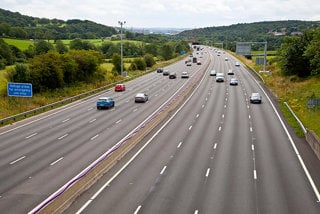The Government says that the cleanest lorries will pay less to use UK roads after it announced changes to the road user levy.
From February next year, lorries meeting the latest Euro VI emissions standards will be eligible for a 10% reduction in the cost of the HGV levy.
The cleanest lorries generate 80% less nitrogen emissions than dirtier ones, said the Department for Transport (DfT). Those lorries that don’t meet the latest emissions standards will be expected to pay 20% more.
Roads Minister Jesse Norman said: “Heavy goods vehicles account for around a fifth of harmful nitrogen oxide emissions from road transport, but they only travel 5% of the total miles.
“That’s why we’re changing the HGV levy to encourage firms to phase out the most polluting lorries and bring in the cleanest ones.”
The HGV Road User Levy, introduced in 2014, was brought in as a first step to ensure lorries pay a charge to cover the greater wear and tear they cause to road surfaces than other vehicles. This change to the levy will further incentivise the industry to choose less polluting lorries, said the DfT.
When the change comes into effect, more than half of UK vehicles will pay less. As increasing numbers of companies move to cleaner lorries, the UK haulage industry overall will pay less, it said.
Environment Minister Thérèse Coffey said: “Air pollution has improved significantly since 2010, but we recognise there is more to do which is why we have put in place a £3.5 billion plan to improve air quality and reduce harmful emissions.
“Poor air quality affects public health, the economy, and the environment, and all motorists, including hauliers, must play their part if we are to clean up our air for the next generation.”
However, the Freight Transport Association (FTA) argues that the changes will be at the expense of small and medium-sized businesses, which will be unfairly penalised by the changes in money payable.
"The reduction of 10% in the road user levy for Euro VI lorries is good news" said Christopher Snelling, head of UK policy at FTA, "as it shows recognition for the success of the HGV Euro VI vehicles, which have 80% lower real world local emissions than previous lorries.
“However, the introduction of the increased levy on pre-Euro VI trucks will actually hurt those small and medium sized business that already face increased costs as they need to upgrade to Euro VI vehicle early to be compliant with the planned Clean Air Zones.
"It hurts them because the re-sale value of their slightly older lorries, the Euro IV and Vs, has fallen so much - making the jump to afford a new Euro VI so much greater."
FTA believes the Government should have loaded the increase on to older most polluting lorries (Euro III and below) to create a short-term market for the Euro IV and V vehicles that those delivering to city centres will be seeking to sell on.
Snelling concluded: "Trucks have been getting cleaner for decades, we are not dealing with an intractable problem but merely the question of how soon do the beneficial changes come.
“The Government's approach to cleaner air risks putting some smaller hauliers' livelihoods at risk for only a temporary gain on air quality. The reform of the Levy was an opportunity to help, and for the most part the Government has failed to take it."






















Login to comment
Comments
No comments have been made yet.